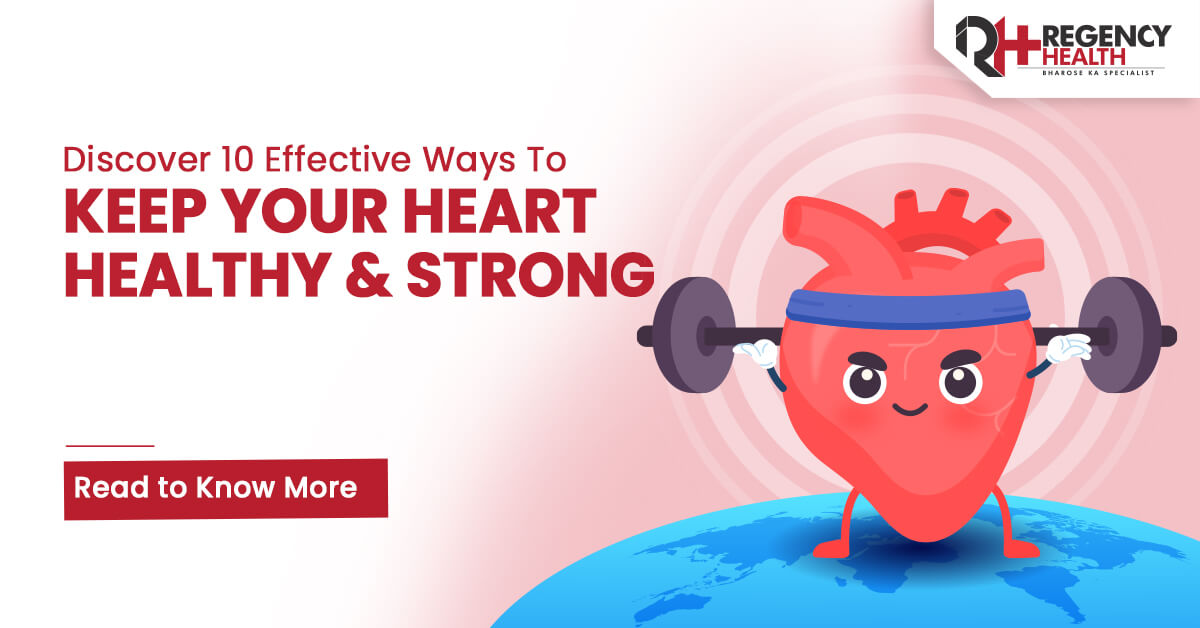10 Ways to Improve Your Heart Health

Heart health is one of the most important aspects of overall well-being. A healthy heart not only supports a longer life but also improves energy, mood, and productivity. Cardiovascular diseases are among the leading causes of death worldwide, but many of these conditions are preventable with the right lifestyle choices.
1.Maintain a Balanced Diet
Eating a heart-healthy diet is the foundation of cardiovascular wellness. Focus on:
- Fruits and vegetables, rich in fiber, vitamins, and antioxidants
- Whole grains such as oats, brown rice, and whole wheat
- Lean proteins like fish, poultry, legumes, and nuts
- Healthy fats, including olive oil, avocado, and omega-3-rich foods
- Limit processed foods, trans fats, refined sugars, and excess salt
A balanced diet helps lower cholesterol, blood pressure, and inflammation, which are key factors in preventing heart disease.
2.Exercise Regularly
Physical activity strengthens the heart muscle, improves blood circulation, and helps maintain a healthy weight. Aim for at least 150 minutes (about 5 hours) of moderate exercise per week, including:
- Brisk walking or jogging
- Swimming or cycling
- Strength training or bodyweight exercises
Even small, consistent workouts can reduce the risk of heart disease significantly.
3.Maintain a Healthy Weight
Being overweight puts extra strain on the heart and increases the risk of high blood pressure, diabetes, and cholesterol problems. Monitoring your weight and achieving a healthy BMI through diet and exercise is crucial for cardiovascular health.
4.Manage Stress Effectively
Chronic stress can negatively impact heart health by increasing blood pressure and triggering unhealthy coping habits like overeating or smoking. Manage stress through:
- Meditation or mindfulness practices
- Deep breathing exercises
- Yoga or gentle stretching
- Hobbies and recreational activities
Managing stress also supports mental and psychiatric well-being.
5.Avoid Smoking and Limit Alcohol
Smoking damages blood vessels, reduces oxygen in the blood, and raises the risk of heart attack and stroke. Limiting alcohol intake to moderate levels or quitting entirely can significantly reduce cardiovascular risk.
6.Monitor Blood Pressure and Cholesterol
High blood pressure and elevated cholesterol levels often show no symptoms but are major contributors to heart disease. Regular check-ups allow early detection and management. Your doctor can recommend lifestyle changes or medications to maintain healthy levels.
7.Get Enough Sleep
Adequate sleep is essential for heart health. Adults should aim for 7 to 9 hours per night. Poor sleep increases the risk of high blood pressure, obesity, and diabetes, all of which affect cardiovascular function.
8.Stay Hydrated
Proper hydration supports blood circulation, helps maintain optimal blood pressure, and assists in overall bodily functions. Drink enough water throughout the day and limit sugary or caffeinated beverages that can negatively impact the heart.
9.Reduce Salt and Sugar Intake
Excess salt raises blood pressure, while high sugar intake can lead to obesity and diabetes. Both conditions strain the heart. Opt for natural herbs and spices for flavoring and minimize processed foods and sugary drinks.
10.Regular Medical Check-Ups
Even if you feel healthy, regular check-ups help detect early signs of heart disease. Screening for blood pressure, cholesterol, and other risk factors allows timely intervention. Consulting a medical professional ensures personalized guidance for preventive care and long-term heart health.
Conclusion
Maintaining heart health is a lifelong commitment that requires attention to diet, exercise, stress management, and regular medical care. By following these 10 tips, you can significantly reduce the risk of heart disease and improve overall well-being. For personalized guidance and professional advice, consulting the best cardiologist in Lucknow can help you take proactive steps toward a stronger, healthier heart.
Also Read: How to Take Care of Your Heart Health
Frequently Asked Questions (FAQs)
How Can I Know If My Heart Is Healthy?
Regular check-ups, monitoring blood pressure and cholesterol, and maintaining a healthy lifestyle help assess heart health.
Is Exercise Necessary for Heart Health?
Yes, regular physical activity strengthens the heart, improves circulation, and lowers the risk of cardiovascular disease.
Can Stress Affect My Heart?
Chronic stress increases blood pressure and triggers unhealthy habits, which can harm heart health.
How Often Should I See a Cardiologist?
If you have risk factors like high blood pressure, diabetes, or a family history of heart disease, annual or semi-annual check-ups are recommended.
What Foods Are Best for Improving Heart Health?
Fruits, vegetables, whole grains, lean proteins, and healthy fats like olive oil and nuts are excellent for heart health. Limiting salt, sugar, and processed foods is equally important.

 Call-an-Ambulance
Call-an-Ambulance



